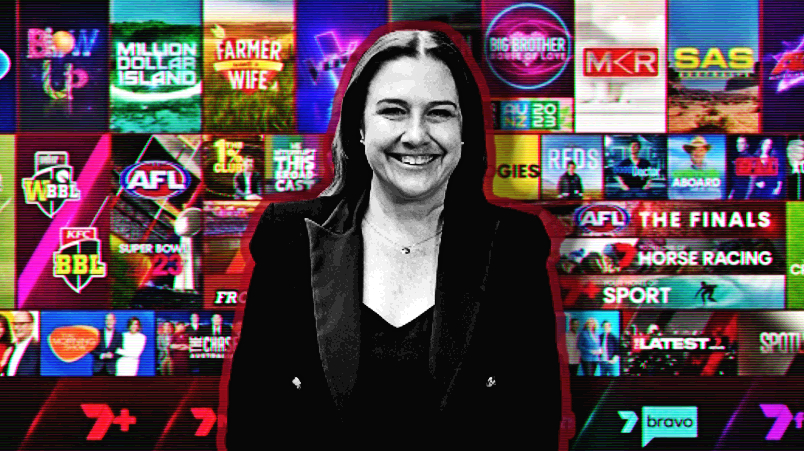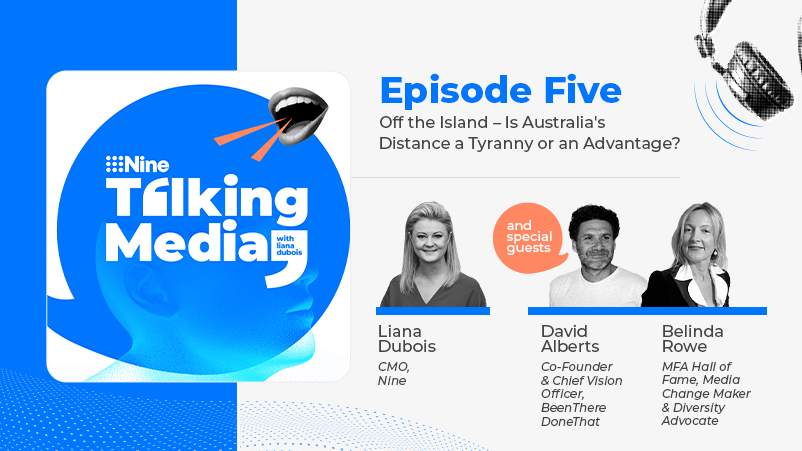Why Mel Hopkins left Optus for Seven CMO gig: Not putting 'lipstick on a pig’; Big transformation plan looms – sharpening marketing, hitching it to the P&L – and her take on the Optus cyber attack

Seven marketing and audience chief Mel Hopkins: Brand investment can turn TV's audience fortunes around and drive earnings growth – but there's a transformation job ahead to see off the streamers.
Mel Hopkins says she hasn’t gone to Seven “to put lipstick on a pig”. The former Optus CMO says CEO James Warburton wants “total transformation” and she’s hatched a four-point plan, which includes linking Seven’s marketing activity and investment directly to earnings and the P&L “in real time”. Anything less, she says, “and I am failing to do my job”. That means growing both the brand and its equity as well the number of eyeballs tuning into Seven's assets as a destination – fast. Hopkins thinks Seven Plus can outpoint the streamers and reckons their ad-funded tiers may fizzle as Covid-driven growth wanes. But she needs to build sharper digital marketing smarts. Plus, Hopkins opens up on the Optus data hack, a cautionary tale for brands.
What you need to know:
- Mel Hopkins swapped Optus for Seven five months ago and has a transformation job ahead.
- She’s planning a brand offensive in a bid to attract more audiences, keep them and make Seven – particularly Seven Plus – a destination.
- YouTube will be part of that plan – Hopkins last year was singing the platform's praises along with 'virtual professor' Mark Ritson and says the network needs to cover all bases to drive audience growth – but she says Meta and Google can’t deny they are marking their own homework.
- Hopkins thinks the streaming market is too crowded and some will fail, with ad-funded tiers proving harder than some may have anticipated.
- She has committed to linking marketing investment to the P&L in short order: “I'm not here to do a vanity job to make myself feel good. If the business is not growing EBIT, I am failing in my job.”
- She says Seven has deep talent (her LinkedIn feed is sprinkled liberally with odes to colleagues) but aims to build greater strategic and advanced digital marketing capability.
- The Optus hack and its aftermath was brutal, but the relatively rapid bounce-back – four months – shows the value of having a strong brand before going into a crisis, per Hopkins.
- Get the download via the podcast here.
James likes to win … He doesn’t want us sitting as an old linear television station that is losing share.
Despite the trauma of last year’s data hack – Hopkins says she didn’t sleep for five weeks and copped heavy flack, “some of it fair, some of it deeply unfair, some of it personal”, Optus’ former CMO “was wasn’t actively looking to leave” the telco. But Seven CEO James Warburton made her an offer she couldn’t refuse.
“After a few conversations with James, what really caught me was the huge opportunity for transformation. There’s a huge opportunity for me in a different type of industry, lateral growth and being part of a really tight executive team. And to be quite frank, in a business that, well, everyone knows needs to change.”
Warburton doesn’t like losing. But the TV landscape – in all its forms – is becoming too crowded. Hopkins job is to help ensure others throw in the towel and ultimately exit. Seven Plus will be the key battleground against the streamers and the network’s traditional rivals.
“James likes to win … That is part of his DNA and James wants to be in a position where he pushes Seven Plus … to push us to the next stage of where a transformational business should sit. He doesn’t want us sitting as an old linear television station that is losing share,” says Hopkins.
“He’s also quite sensible, so he’s not going to throw away the core as we’re pushing [through] the transformation. But the honest fact is that the industry is going through cyclical change,” she adds. “Plenty of industries do that – manufacturing, banking, retail – and what is happening in this industry is textbook economics. You have three large incumbents and new entrants coming in. They shake up the market and then some survive, and some leave,” says Hopkins. “We’re passionate about winning.”
She thinks global streamers may have done their dash, after accelerated growth during the pandemic, “when people had nothing else to do”. “If there wasn’t Covid, would you have had the same growth of the paid subscription services?” Either way, her aim is to make Seven Plus “Australia’s number one local streaming platform”.
These paid subscription businesses, there's not enough room for them all, particularly those without ad-funded models. Netflix has struggled a little bit with their ad funded model. You can't keep investing billions in developing content without getting the return.
Shakeout ahead?
To do that Hopkins has to make Seven Plus – and the broader network properties – a destination, something she concedes the likes of Netflix have done so well. That means building brand equity as much as quality shows to attract more eyeballs and keep them there.
Broadcasters used to have that sort of ‘destination’ cachet. Hopkins insists they can get it back, and says their top programs are still pulling in greater audiences than the streamers can deliver. Meanwhile, she predicts some of those either in-market or set to launch ad-funded streaming tiers will find them hard to scale and may ultimately fizzle out, with some media buyers, notably OMG investment chief Kristiaan Kroon, already starting to question their appetite.
“Absolutely they can get it back … but Netflix didn’t actually launch their brand, they launched on a program, which was House of Cards. So they launched on content and the brand was built thereafter. I love the fact that we have this competition, because it has forced everyone to think really hard about [their] content.
“But the question is, has broadcasting lost out overall? There are 1.5 million Australians watching Seven News for one hour every single day. The same with live sport and … some of the entertainment programming also brings in huge audiences. If you look at Farmer [Wants a Wife], I’ve got it on very good authority that those numbers are substantially more than some of the paid subscription [platforms], what you would consider top programs, by a long way,” claims Hopkins.
“I think the challenge for what is considered traditional broadcast TV channels is ensuring that we're relevant and we're demonstrating that we're moving with the times. These paid subscription businesses, there's not enough room for them all, particularly those without ad-funded models,” she adds. “Netflix, as you know, has struggled a little bit with their ad funded model. You can't keep investing billions in developing content without getting the return.”
I don't think it's a sustainable business model to just focus on content without building equity in the brand and the platform – and I don't believe many [platforms] globally have gone and built that equity. One can’t survive without the other.
Brand rebuilding
Which is where brand marketing comes in. Hopkins is adamant it can change a show’s fortunes, maybe even an entire network’s. She sees a certain irony that the likes of Seven stake their reputations on enabling advertiser growth, but have arguably undercooked their own.
“To a degree, absolutely [marketing can turn the audience tide]. It's sort of why James and I agreed the importance of having audience in my title – it's Chief marketing and Audience Officer,” says Hopkins.
“My team's job is to drive quality audiences to programs ... But then it really comes down to the content and the stickiness. That is no different to any category where you're driving demand, foot traffic, clicks or visits. If the product ends up not being up to scratch, then you've got to look at, is the wrong type of traffic coming in, or do we have to look at reviewing and refreshing the product? But without doubt, one of my team’s core KPIs is driving quality audiences to our programs and then actually really driving stickiness and loyalty,” she says. “I don’t think I’d be here if I didn’t feel I could do it differently, and hopefully better.”
Hopkins says brand investment is key to enabling that shift – emphasising quality of audience as much as quantity – and says there are parallels with her strategy at Optus, where she spent six and a half years.
“When I first came to Optus, the business was obsessed with volume. They were driving low deals and low prices; in market 80 per cent of the spend was on tactical advertising. That drove great short-term gains, but it actually didn't drive loyalty and it didn't drive profitability. So the big job that I'm super proud of with the team at Optus is how we swung the pendulum and actually drove profitable growth by building a brand and having people wanting to choose us,” says Hopkins.
“Because if you're just going for bottom of the funnel – people in market ready to buy – they're not necessarily going to be loyal and they'll just move when something better comes around. For me, that is the great dynamic between the destination and platforms people come to and the content that they watch,” she adds.
Which is why investing in brand building and content are symbiotic growth imperatives – which Hopkins sees as a gap in the broader market.
“I don't think it's a sustainable business model to just focus on content without building equity in the brand and the platform – and I don't believe many people globally have gone and built that equity into [those] platforms,” she says. “One can’t survive without the other.”
I knew that we bought a bit of BVOD [at Optus] but I had no idea at how sophisticated that product was. It was quite embarrassing ... If I don’t know about that as a marketer, do Australians know? So there's a huge opportunity [to market more aggressively]. But I want to stop the conversation about ‘linear’ and digital.
YouTube amnesty
Hopkins last year was part of a YouTube push to flaunt its brand building capabilities, alongside the likes of Menulog CMO Simon Cheng and ‘virtual professor’ Mark Ritson. Around the same time, her erstwhile colleague, Optus Director of Media and Marketing Operations, Nicole Smart, told a TV industry conference that the networks weren’t delivering the same quality attribution and metrics as YouTube – and, despite enormous demand, were not delivering a polished BVOD product for advertisers. Which ruffled a few feathers.
Hopkins admits that while Optus bought a lot of TV, she was not fully across BVOD – now the heart of Seven’s transformation push.
“I knew that we bought a bit of BVOD but I had no idea how sophisticated that product was. It was quite embarrassing – the 15,000 hours of content, the fresh content on Seven Plus that's not even available on broadcast, some of the amazing programming from NBCU, for example. If I don’t know about that as a marketer, do Australians know the power of Seven Plus? So I think there's a huge opportunity [to market more aggressively]. But I want to stop the conversation about ‘linear’ and digital.”
Now on the other side of fence, she also holes one of the arguments made last year by Barlow and Smart around measurement and attribution. “Google and Meta – and they won't argue with me – they provide the measurement of their success. We all know that there is a third party [OzTam] that does that in the world of screens when it comes to free-to-air, be that television or streaming.”
But, for a TV exec, Hopkins remains refreshingly pragmatic on YouTube, now taking circa $2bn out of the Australian market annually and set to be one of the key beneficiaries of an estimated $300m outflow of terrestrial TV ad dollars in 2023.
“YouTube is incredibly important as a channel, and as we start building out our brand and programming, I will be using YouTube to reach audiences, to remind them to come to Seven,” she says. “I don't think it's one or the other.”
I don't think there’s a single CMO globally that should be turning up for work unless they are actually contributing to the bottom line – and know that what they're doing is contributing to the bottom line – [otherwise] you don't deserve to do the job.
Commit to EBIT
Connecting marketing investments to the P&L – and living or dying on her ability to drive commercial outcomes – means Hopkins will be using all weapons in the arsenal. She thinks all marketers should be judged by the same measure.
“I don't think there’s a single marketer or CMO in the land or actually globally that should be turning up for work unless they are actually contributing to the bottom line – and know that what they're doing is contributing to the bottom line – [otherwise] you don't deserve to do the job,” she says.
“At Optus I was able to demonstrate where we did that from marketing … or that for every media dollar that we spent, we were able to drive $1.20 right down to profitability. And I plan to do the same here,” says Hopkins. “I'm not here to do a vanity job to make myself feel good. If the business is not growing EBIT, I am failing in my job.”
Which is why “demonstrating to the board and executive committee that they have bought in an experienced marketer that is demonstrating real time commercial impact to the bottom line,” is priority number one for Hopkins.
Number two is “stopping the discussion around overnight metro ratings”, a drum James Warburton has been banging for some time. “I don't think it's a fair assessment of what people view – you don't judge Netflix like that,” says Hopkins. “If we get the narrative right on that, we'll start to turn the tide.”
The third plank is a brand building, brand equity push. “That’s a big priority. Whether that is what our brand stands for, whether that is how we take our shows to market, you will see some new stuff from Seven.”
Lastly Hopkins wants to attract more marketing firepower to the sector. “I want media to be seen as one of the best destinations for the best marketers in Australia.”
The thing I was most proud of is how quickly the brand bounced back. Some people through it would take 12,18 months. It actually went back to what it was [pre-hack] within four, which is remarkable.
Hack lessons
When push coms to shove, says Hopkins, brand strength will help firms get through the toughest times. She speaks from recent experience. The Optus hack in September last year, in which 10 million current and former customers had their personal data stolen, with Optus setting aside $140m for new passports and the like, merits a podcast in itself, per Hopkins.
"I've never learned so much in my entire career as I have working through that. But the importance of having a strong brand before you go into a crisis is a lesson for marketers," she says. "The thing I was most proud of is how quickly the brand bounced back. Some people thought it would take 12-18 months. It actually went back to what it was [pre attack] within four, which is remarkable.
Being honest with customers "and owning what happened" is also "absolutely critical, and some brands since the attack have probably put their heads in the sand around that. But that is important, to have integrity", says Hopkins.
"Finally, you realise your critical role in an organisation when something like that happens. I was the third person our national head of cybersecurity called. I didn't sleep for five weeks. I was on the back end of a whole lot of criticism, some of it fair, some of it deeply unfair, some of it personal. I saw a brand that my team and I built get shattered overnight, and it's quite heartbreaking for that to happen, but thank god I was surrounded by an amazing team and had great leadership to work through it," she says.
"I never thought that I would live through anything like that. But I am better for it, and I know a lot more about cyber [security] than I ever did."
Listen to the podcast here.



